We often think of the law as being a solution to all social problems. But the law is sometimes ahead of how people actually live, and sometimes it’s behind. When it comes to women having control over their personal lives, there has been an eternal tussle with society as well as with the law to recognise that women do not simply represent their family, caste, community, and so on, but deserve the right to make decisions for themselves and act for themselves. Here are some ways in which we see how this struggle has been reflected in laws on women’s bodily and sexual autonomy. 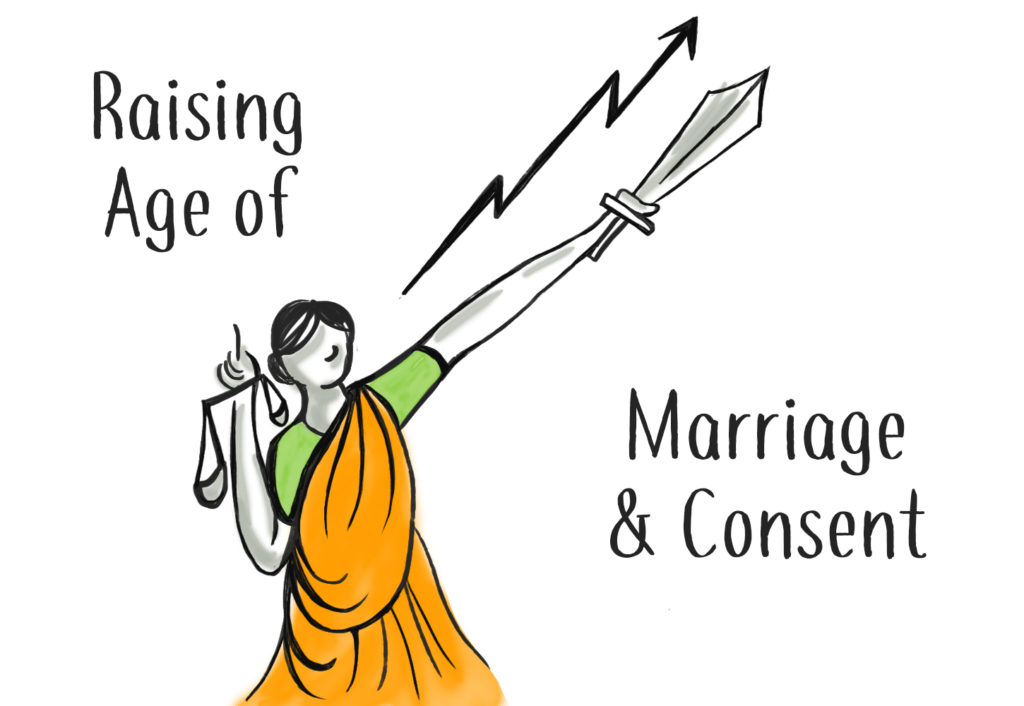 Raising the age of consent and marriage This is perhaps the simplest but the most widespread change for women’s rights. In 1860, the minimum age at which a woman/girl could get married in India was set at 10! (It was a common practice even well into the 20th century to marry off young girls as soon as they attained puberty, because it meant they were ready to have children.) Over the next 140-odd years it rose to the present age of 18, under the Prohibition of Child Marriage Act of 2006. For the most part, society and the law have both recognised sex as appropriate (and legal) only inside marriage. Since the mid 18th century, the law had set an ‘age of consent’ – the age at which someone is considered legally capable of consenting to sex – in addition to the legal age of marriage. This was not so much because it approved of sex outside marriage, but to define rape better. The legal age of marriage and of consent were raised simultaneously over the years until 2006, when the legal marriageable age became 18 but the age of consent stayed at 16. In 2012, the Prevention of Children from Sexual Offences (POCSO) Act raised the age of consent to 18. The arguments for raising the age of consent and marriage have been that women will not be forced to have sex or have children when they are too young to make independent decisions and their bodies are not developed enough to handle sex and childbirth. However, raising the age of consent from 16 to 18 has seen some opposition, as it also criminalises sex between young people, even if it is consensual.
Raising the age of consent and marriage This is perhaps the simplest but the most widespread change for women’s rights. In 1860, the minimum age at which a woman/girl could get married in India was set at 10! (It was a common practice even well into the 20th century to marry off young girls as soon as they attained puberty, because it meant they were ready to have children.) Over the next 140-odd years it rose to the present age of 18, under the Prohibition of Child Marriage Act of 2006. For the most part, society and the law have both recognised sex as appropriate (and legal) only inside marriage. Since the mid 18th century, the law had set an ‘age of consent’ – the age at which someone is considered legally capable of consenting to sex – in addition to the legal age of marriage. This was not so much because it approved of sex outside marriage, but to define rape better. The legal age of marriage and of consent were raised simultaneously over the years until 2006, when the legal marriageable age became 18 but the age of consent stayed at 16. In 2012, the Prevention of Children from Sexual Offences (POCSO) Act raised the age of consent to 18. The arguments for raising the age of consent and marriage have been that women will not be forced to have sex or have children when they are too young to make independent decisions and their bodies are not developed enough to handle sex and childbirth. However, raising the age of consent from 16 to 18 has seen some opposition, as it also criminalises sex between young people, even if it is consensual. 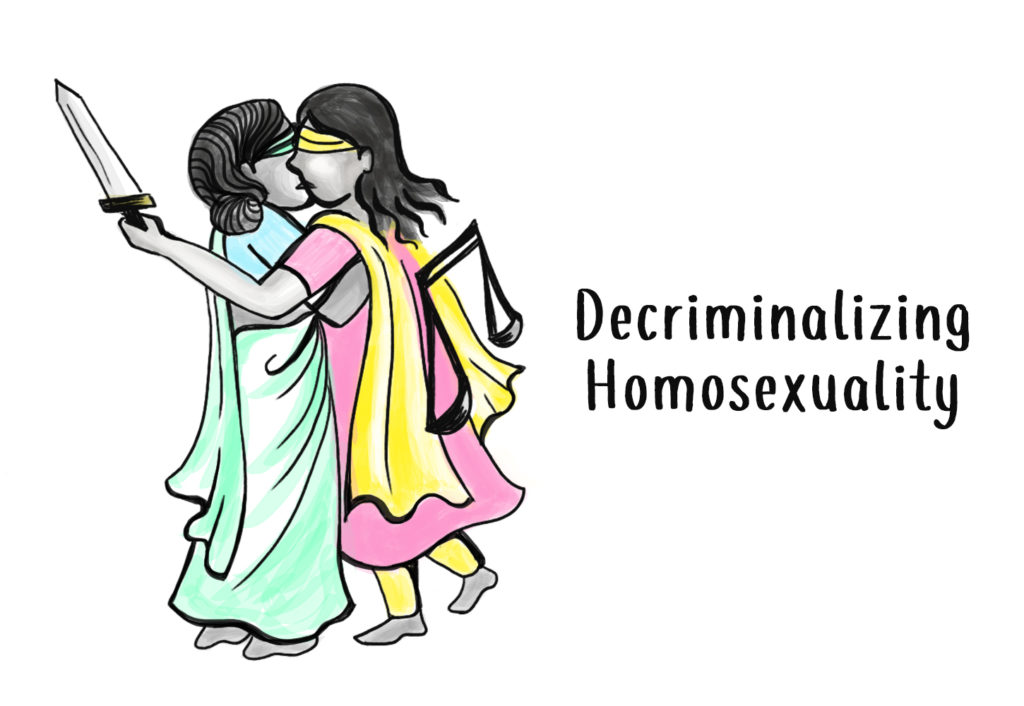 Decriminalising homosexuality In colonial times, same-sex relations between consenting adults were criminalised under Section 377 of the Indian Penal Code (IPC). In September 2018, the Supreme Court read down this law, calling it “arbitrary” and “irrational”. Though Section 377 only refers to sex, there has been a strong push for the Court to recognise the entirety of homosexual relationships, including love. The decriminalisation of homosexuality affects all members of the LGBTQ community, but it has meant that women of all sexual orientations have the freedom to choose a romantic and sexual partner without the fear of being treated as criminals.
Decriminalising homosexuality In colonial times, same-sex relations between consenting adults were criminalised under Section 377 of the Indian Penal Code (IPC). In September 2018, the Supreme Court read down this law, calling it “arbitrary” and “irrational”. Though Section 377 only refers to sex, there has been a strong push for the Court to recognise the entirety of homosexual relationships, including love. The decriminalisation of homosexuality affects all members of the LGBTQ community, but it has meant that women of all sexual orientations have the freedom to choose a romantic and sexual partner without the fear of being treated as criminals. 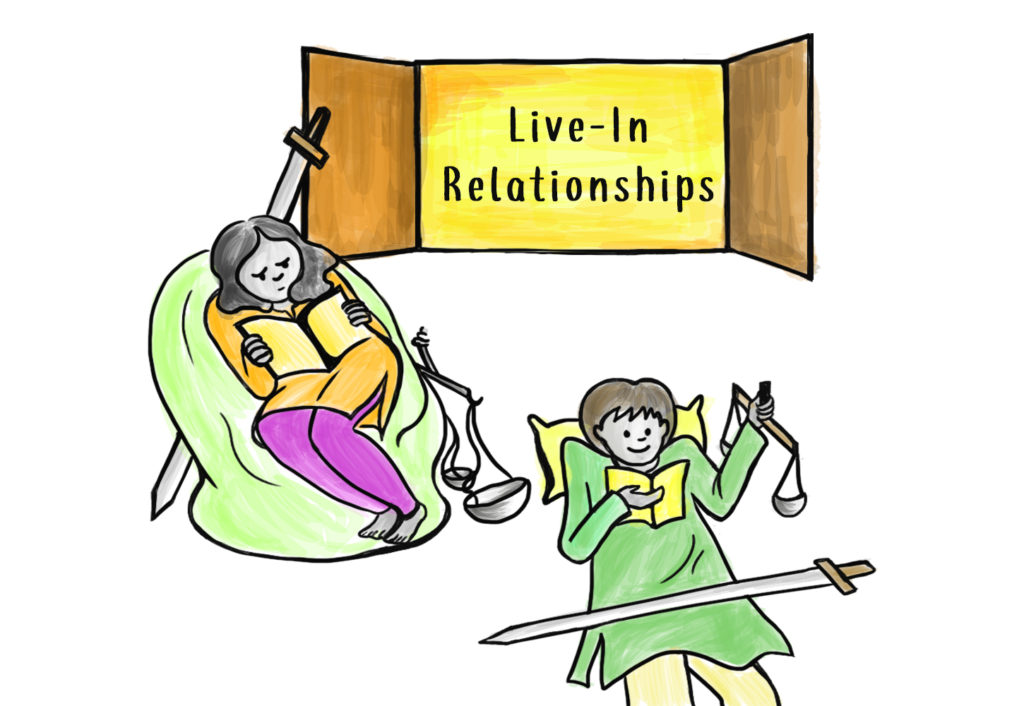 Legal acceptance of live-in relationships Courts have often supported the right of couples to live together without being married, even though there is no specific law that covers live-in relationships or defines them in concrete terms. In 2013, one law expanded to refer to live-in relationships: the Protection of Women from Domestic Violence Act of 2005. The Act includes protection not just from physical violence but emotional/verbal, sexual and economic abuse, harassment for dowry, and the threat of violence. Laws against domestic violence aren’t all that old in India – the earliest was in 1961. The recent inclusion of live-in relationships in domestic violence law may be small but it is significant, as it recognises women’s right to safety within a relationship, even if it is outside the socially accepted framework of marriage.
Legal acceptance of live-in relationships Courts have often supported the right of couples to live together without being married, even though there is no specific law that covers live-in relationships or defines them in concrete terms. In 2013, one law expanded to refer to live-in relationships: the Protection of Women from Domestic Violence Act of 2005. The Act includes protection not just from physical violence but emotional/verbal, sexual and economic abuse, harassment for dowry, and the threat of violence. Laws against domestic violence aren’t all that old in India – the earliest was in 1961. The recent inclusion of live-in relationships in domestic violence law may be small but it is significant, as it recognises women’s right to safety within a relationship, even if it is outside the socially accepted framework of marriage. 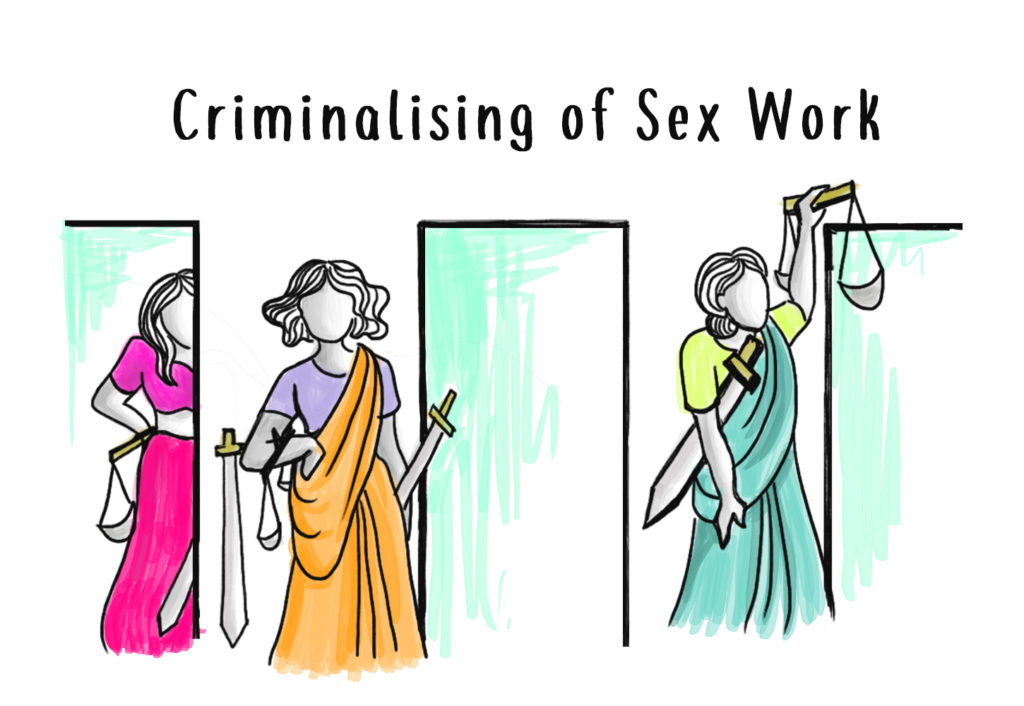 Criminalising of sex work Sex work has had a long and complicated relationship with the law in India – and the law has moved backwards on it in some ways. During the British Raj, prostitution was sometimes actively encouraged, and sex workers were even given licences and regular health exams! Prostitution was legal until the late 1930s. In 1956, the Immoral Traffic (Supression) Act made public and organised prostitution (like working in brothels or running brothels) illegal, but prostitution could be practised in private if it was done voluntarily – and this has remained so over the years. A contentious new Bill called the Trafficking of Persons (Prevention, Protection and Rehabilitation) Bill was passed by the Lok Sabha in July 2018, but has not yet become law. Many oppose this Bill for several reasons, including because they say it does not explicitly distinguish between voluntary and forced sex work, and views sex work through the lens of morality.
Criminalising of sex work Sex work has had a long and complicated relationship with the law in India – and the law has moved backwards on it in some ways. During the British Raj, prostitution was sometimes actively encouraged, and sex workers were even given licences and regular health exams! Prostitution was legal until the late 1930s. In 1956, the Immoral Traffic (Supression) Act made public and organised prostitution (like working in brothels or running brothels) illegal, but prostitution could be practised in private if it was done voluntarily – and this has remained so over the years. A contentious new Bill called the Trafficking of Persons (Prevention, Protection and Rehabilitation) Bill was passed by the Lok Sabha in July 2018, but has not yet become law. Many oppose this Bill for several reasons, including because they say it does not explicitly distinguish between voluntary and forced sex work, and views sex work through the lens of morality. 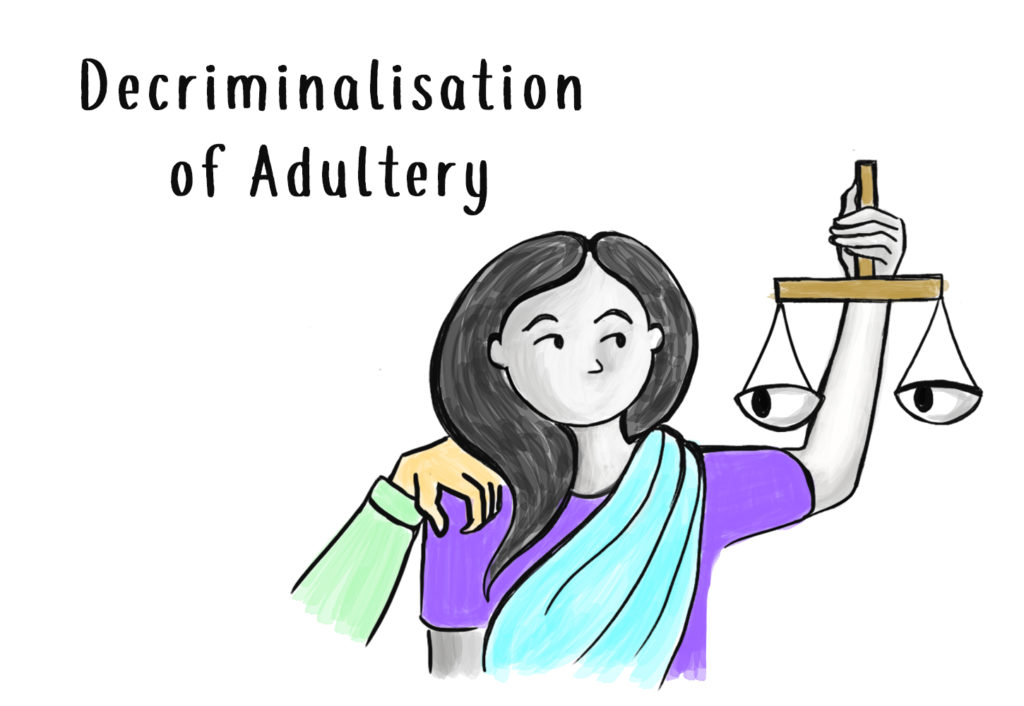 Decriminalisation of adultery India had a strange law (another colonial relic) that made adultery a crime, but only if you were a man sleeping with another man’s wife, without that man’s permission. According to Section 497 of the Indian Penal Code, consensual sex with a married woman “without the consent or connivance” of her husband would be considered adultery, which could attract five years in prison or a fine, or both. In addition to unfairly singling out the man in the relationship, this law also treated women as the property of their husbands, and as beings unable to make decisions of their own – or face the consequences of these decisions. It was only in September 2018 that the Supreme Court struck this law down. In decriminalising adultery, the court upheld consensual relationships, reduced the State's role in policing marriages, and tacitly recognised women’s choice to have sex outside marriage.
Decriminalisation of adultery India had a strange law (another colonial relic) that made adultery a crime, but only if you were a man sleeping with another man’s wife, without that man’s permission. According to Section 497 of the Indian Penal Code, consensual sex with a married woman “without the consent or connivance” of her husband would be considered adultery, which could attract five years in prison or a fine, or both. In addition to unfairly singling out the man in the relationship, this law also treated women as the property of their husbands, and as beings unable to make decisions of their own – or face the consequences of these decisions. It was only in September 2018 that the Supreme Court struck this law down. In decriminalising adultery, the court upheld consensual relationships, reduced the State's role in policing marriages, and tacitly recognised women’s choice to have sex outside marriage. 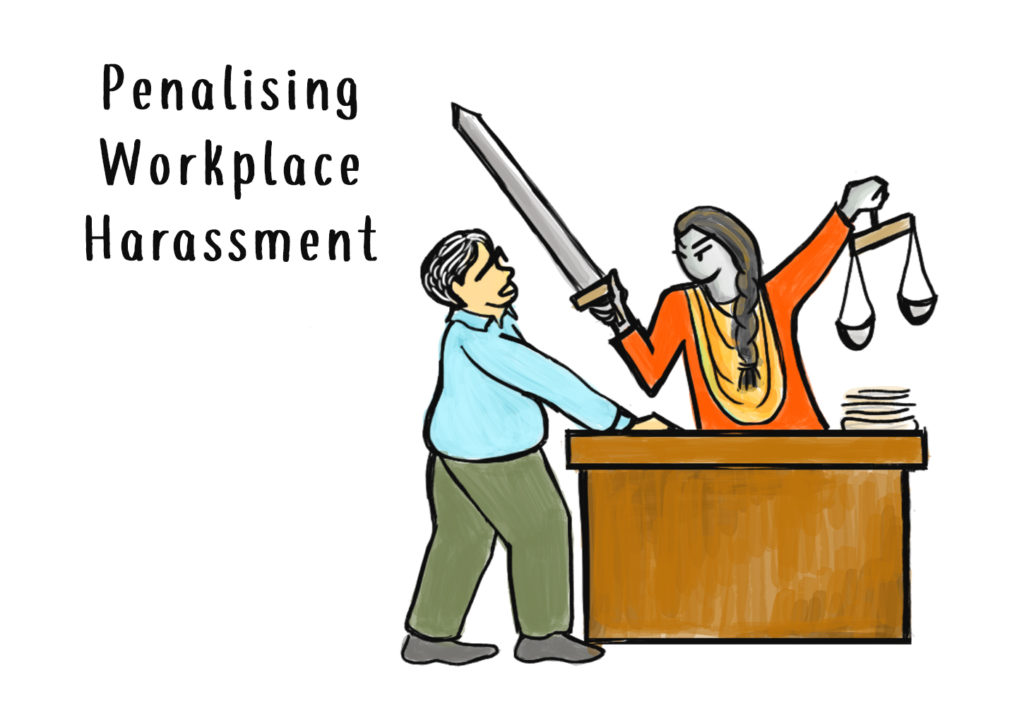 Penalising workplace harassment Workplace sexual harassment only began to be addressed by the law in 1997, with the instituting of the Vishakha guidelines (which came about a result of the Bhanwari Devi case). These guidelines were replaced in 2013 by the Sexual Harassment of Women at the Workplace (Prevention, Prohibition and Redressal) Act. The Act expands the definition of a workplace to cover the unorganised sector as well, it expands the idea of who an employee is (part-time workers, interns, domestic workers are now all covered), and what a company/employer’s responsibilities are to employees. It also lays down the rules for setting up a process to deal with allegations of assault or harassment. Importantly, the Act recognises the power imbalance between genders in the workplace and upholds women’s right to have a job and be seen as a worker/employee/labourer – and not be treated as a sexual object. It sees that women have the right to refuse unwanted sexual advances at work, and holds the workplace responsible for protecting this right.
Penalising workplace harassment Workplace sexual harassment only began to be addressed by the law in 1997, with the instituting of the Vishakha guidelines (which came about a result of the Bhanwari Devi case). These guidelines were replaced in 2013 by the Sexual Harassment of Women at the Workplace (Prevention, Prohibition and Redressal) Act. The Act expands the definition of a workplace to cover the unorganised sector as well, it expands the idea of who an employee is (part-time workers, interns, domestic workers are now all covered), and what a company/employer’s responsibilities are to employees. It also lays down the rules for setting up a process to deal with allegations of assault or harassment. Importantly, the Act recognises the power imbalance between genders in the workplace and upholds women’s right to have a job and be seen as a worker/employee/labourer – and not be treated as a sexual object. It sees that women have the right to refuse unwanted sexual advances at work, and holds the workplace responsible for protecting this right. 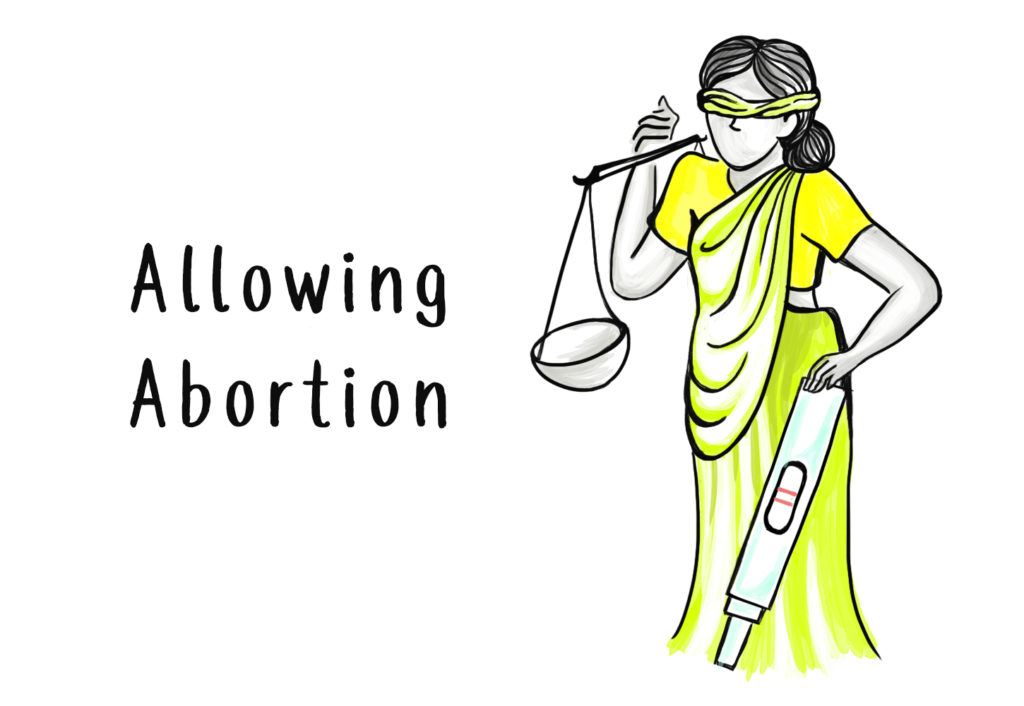 Allowing abortion For over a century, abortion used to be illegal in India unless it was to save the life of the mother. This changed with the Medical Termination of Pregnancy Act of 1971, which allowed abortion before 12 weeks of pregnancy but required the opinion of a doctor. Abortion at 20 weeks was allowed with the opinion of two doctors. Amendments to this law were proposed in 2014, which included replacing the term “married woman and her husband” to broaden it to “any woman or her partner”, allowing abortions for rape victims upto 24 weeks of pregnancy, and allowing abortion at any point for substantial foetal abnormalities. These amendments have not been passed yet.
Allowing abortion For over a century, abortion used to be illegal in India unless it was to save the life of the mother. This changed with the Medical Termination of Pregnancy Act of 1971, which allowed abortion before 12 weeks of pregnancy but required the opinion of a doctor. Abortion at 20 weeks was allowed with the opinion of two doctors. Amendments to this law were proposed in 2014, which included replacing the term “married woman and her husband” to broaden it to “any woman or her partner”, allowing abortions for rape victims upto 24 weeks of pregnancy, and allowing abortion at any point for substantial foetal abnormalities. These amendments have not been passed yet. 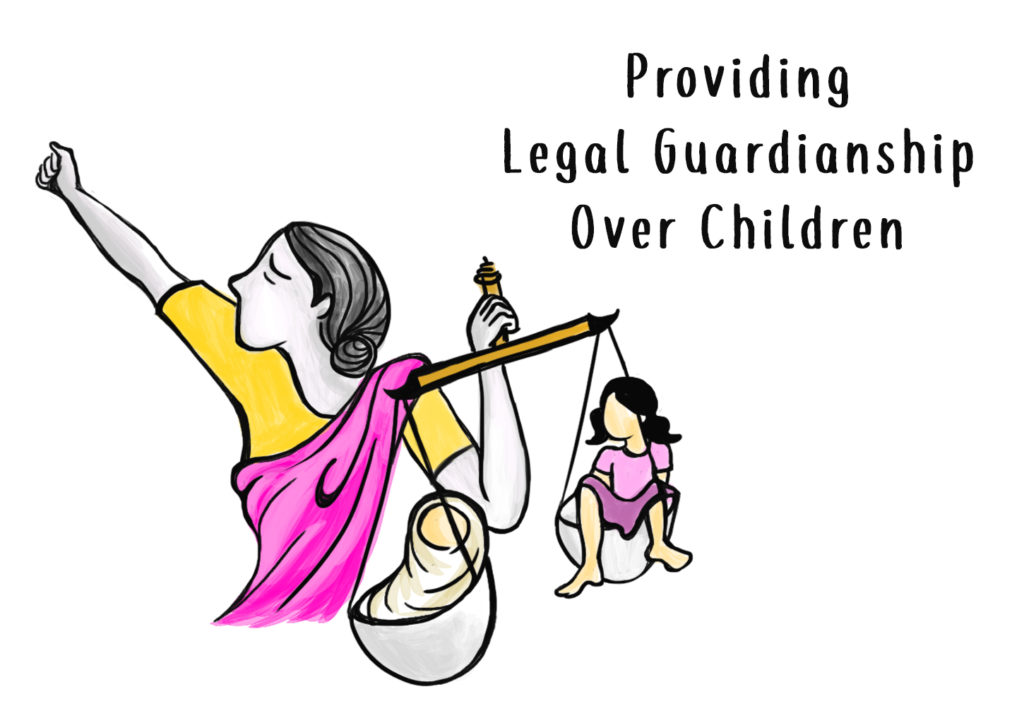 Providing legal guardianship over their children Indian law (including Hindu and Muslim personal laws) sees fathers as the “natural guardians” of their children, without giving mothers equal rights as guardians, even if they are single or unwed mothers. Even procedures like applying for a passport in a child’s name could previously only be done by the mother if the father was dead or incapable of acting as a guardian, and the father’s name would need to be mentioned on many kinds of documentation. In 2015, in the case of ABC vs The State (NCT of Delhi), the Supreme Court allowed an unwed woman to be the sole legal guardian of her child without the father’s consent. Although guardianship laws have not actually been amended, courts have since recognised that single women can also be “natural guardians” of children. And in 2017, the Ministry for Women and Child Development said that it wanted to change all personal laws so that mothers were considered the natural guardians of a child instead of a father.
Providing legal guardianship over their children Indian law (including Hindu and Muslim personal laws) sees fathers as the “natural guardians” of their children, without giving mothers equal rights as guardians, even if they are single or unwed mothers. Even procedures like applying for a passport in a child’s name could previously only be done by the mother if the father was dead or incapable of acting as a guardian, and the father’s name would need to be mentioned on many kinds of documentation. In 2015, in the case of ABC vs The State (NCT of Delhi), the Supreme Court allowed an unwed woman to be the sole legal guardian of her child without the father’s consent. Although guardianship laws have not actually been amended, courts have since recognised that single women can also be “natural guardians” of children. And in 2017, the Ministry for Women and Child Development said that it wanted to change all personal laws so that mothers were considered the natural guardians of a child instead of a father.
Here's How Laws on Sexual Autonomy Have Changed for Women
Sometimes the law is ahead of how people actually live, and sometimes it’s behind
Score:
0/
Related posts
 How To Smell And Taste Good Down There
Partner going down on your buffet? Tips for a yummy garnish!…
How To Smell And Taste Good Down There
Partner going down on your buffet? Tips for a yummy garnish!…
 मैंने खुशी-खुशी अपना दिल उनको दिया, लेकिन उनको चाहिए थे बच्चे और एक देसी बहू
स्थायी बीमारी में डेटि…
मैंने खुशी-खुशी अपना दिल उनको दिया, लेकिन उनको चाहिए थे बच्चे और एक देसी बहू
स्थायी बीमारी में डेटि…
 If Life is Box Full of Chocolate Boys!
#HappyChocolateDay to the men who smile, are vulnerable, and…
If Life is Box Full of Chocolate Boys!
#HappyChocolateDay to the men who smile, are vulnerable, and…
 What is Fellatio? The AOI Sex Glossary
Is it ice-cream ka flavour, like pistachio? Well, it does ha…
What is Fellatio? The AOI Sex Glossary
Is it ice-cream ka flavour, like pistachio? Well, it does ha…
 Sorry Thank You Tata Bye Bye - A Music Video About Age of Marriage In Collaboration With Oxfam India
Sorry Thank You Tata Bye Bye - A Music Video About Age of Marriage In Collaboration With Oxfam India
 Ammuma’s Haircut and Her Romantic Past
If Ammuma's hair was one to divulge, what would it reveal ab…
Ammuma’s Haircut and Her Romantic Past
If Ammuma's hair was one to divulge, what would it reveal ab…
 It Was ‘Twilight’. I Woke Up Bisexual.
How one can stumble upon one's (bi)sexuality with the help o…
It Was ‘Twilight’. I Woke Up Bisexual.
How one can stumble upon one's (bi)sexuality with the help o…
 To All the Boys I Couldn't Love Before
What fleeting connections with many interesting men tell you…
To All the Boys I Couldn't Love Before
What fleeting connections with many interesting men tell you…
 Tell Me Tarot, Will He Ever Come Back?
After Manjari is ghosted, all search for closure leads to he…
Tell Me Tarot, Will He Ever Come Back?
After Manjari is ghosted, all search for closure leads to he…
 How My Girlfriend's Abortion Made Me A Better Man: A Comic
M's story about a life-changing incident.
How My Girlfriend's Abortion Made Me A Better Man: A Comic
M's story about a life-changing incident.
 Do You Know How to Give Women Orgasms?
This app will teach you how and we got some Agents to try it…
Do You Know How to Give Women Orgasms?
This app will teach you how and we got some Agents to try it…
 The AOI Queer Reading List: Desi Languages Version
Queer readings from non-English Indian languages.
The AOI Queer Reading List: Desi Languages Version
Queer readings from non-English Indian languages.
 What Makes Your Sexual Confidence Go Up and Down
Sexual confidence is like a Snakes and Ladders Game
What Makes Your Sexual Confidence Go Up and Down
Sexual confidence is like a Snakes and Ladders Game
 KISS MEIN KITNA HAI DUM: 19 KISS POEMS
Kisses that go from sweet to saucy, tender to raunchy, misch…
KISS MEIN KITNA HAI DUM: 19 KISS POEMS
Kisses that go from sweet to saucy, tender to raunchy, misch…
 Savita Bhabhi and I: A True Love Story
Here is something you should know about me. I wrote three st…
Savita Bhabhi and I: A True Love Story
Here is something you should know about me. I wrote three st…
 How Posing in the Nude Changed My Life
A young gay man who hates being touched, is awkward about ha…
How Posing in the Nude Changed My Life
A young gay man who hates being touched, is awkward about ha…
















































































































































































































































































































































































































































































































































































































































































































































































































































































































































































































































































































































































































